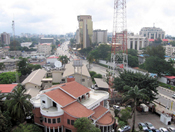



Nigeria, officially the Federal Republic of Nigeria, is a federal constitutional republic comprising thirty-six states and its Federal Capital Territory, Abuja. The country is located in West Africa and shares land borders with the Republic of Benin in the west, Chad and Cameroon in the east, and Niger in the north. Its coast in the south lies on the Gulf of Guinea on the Atlantic Ocean. The three largest and most influential ethnic groups in Nigeria are the Hausa, Igbo and Yoruba. In terms of religion Nigeria is roughly split half and half between Muslims and Christians with a very small minority who practice traditional religion.
The people of Nigeria have an extensive history. Archaeological evidence shows that human habitation of the area dates back to at least 9000 BC. The area around the Benue and Cross River is thought to be the original homeland of the Bantu migrants who spread across most of central and southern Africa in waves between the 1st millennium BC and the 2nd millennium.
The name Nigeria was taken from the Niger River running through the country. This name was coined by Flora Shaw, the future wife of Baron Lugard, a British colonial administrator, in the late 19th century.
Nigeria is the most populous country in Africa, the eighth most populous country in the world, and the most populous country in the world in which the majority of the population is black. It is listed among the "Next Eleven" economies, and is a member of the Commonwealth of Nations. The economy of Nigeria is one of the fastest growing in the world, with the International Monetary Fund projecting a growth of 9% in 2008 and 8.3% in 2009. It is the third largest economy in Africa, and is a regional power that is also the hegemon in West Africa.
Population
- 2009 estimate 158,259,000[1] (8th)
- Density 167.5/km2 (71st)
433.8/sq mi